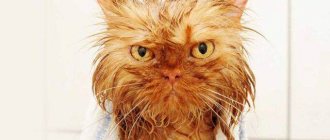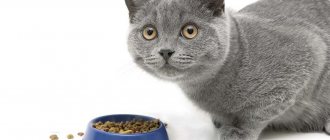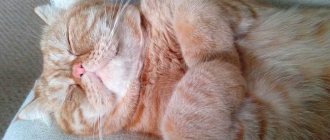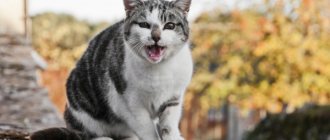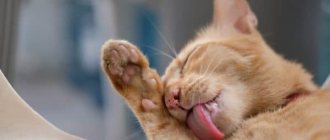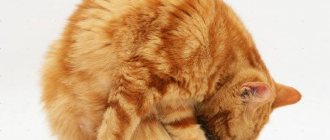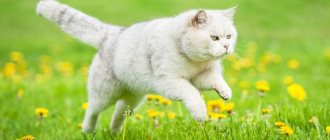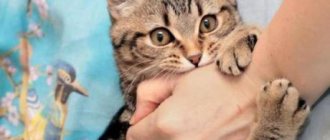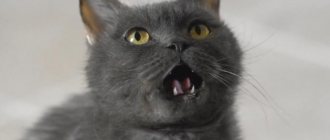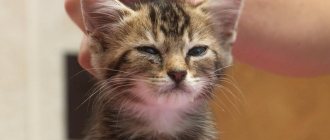While some cats suffer from decreased appetite, others have the opposite problem. An eternally hungry cat is a common occurrence. Owners observe how their pets require more than the permitted dose of dry food per day or natural food of more than 5-7% of body weight, that is, more than the average daily norm. Why is this happening? Is it necessary to supplement feeding if a hungry cat constantly asks for food? The answer depends on each specific situation. Here are some examples of reader questions on this topic.
Situation 1: a hungry cat does not eat up natural food; previously drying was always available
“My cat, until she was 2 years old, ate only dry food; it was always available. Now we have switched her to natural food twice a day and cannot feed her: she constantly asks for food throughout the day. Why does a cat always want to eat?
Over the course of 2 years, the cat got used to a diet where food was available all the time. Now she is limited to two meals, which is unusual for her and can even cause stress. Naturally, it is inappropriate to keep natural food available at all times; such nutrition requires 2-3 meals a day. However, the cat needs time to readjust. This takes from 1 to 3 months. At this time, if possible, you can divide the daily portion into 3 meals instead of two, and then, when the cat gets used to this regimen, remove the daily meal, again dividing it between breakfast and dinner. If it is not possible to feed three times a day, you will just have to wait until the body readjusts.
Article continues after advertisement
How much should a kitten, adult and elderly animal normally eat?
Kittens require food for growth and normal development, and mature animals need food to maintain normal weight. With the onset of old age, cats begin to lose weight because they can no longer eat in the same quantities and do not need large portions. Feeding rates for felines depend on the type of food. Information on the approximate daily amount of dry and wet food required by a kitten:
| Type of feed | Pet's age, months | Daily amount of food, g | |
| Minimum | Maximum | ||
| Dry | 1–2 | 30 | 50 |
| 2–4 | 40 | 65 | |
| 4–6 | 55 | 70 | |
| More than 6 | 60 | 80 | |
| Wet | 170 | 210 | |
| 210 | 300 | ||
| 170 | 255 | ||
Information on the daily requirement of an adult cat for natural food, dry and wet food:
| Type of feed | Animal weight, kg | Daily dose of food, g | |||
| Dry | 3 | 45 | |||
| 4 | 55 | ||||
| 5 | 65 | ||||
| More than 6 | 12 g of product per kilogram of animal body weight | ||||
| Wet | 3 | 190–200 | |||
| 4 | 230–240 | ||||
| 5 | 250–260 | ||||
| More than 6 | 300 | ||||
| Natural | Meat and offal | Cereals | Vegetables | Fermented milk products | |
| 3 | 80 | 45 | 10–15 | 70 | |
| 4 | 100 | 60 | 20–30 | 80 | |
| 5 | 125 | 75 | 25–35 | 100 | |
| More than 6 | 150 | 90 | 30–40 | 130 | |
Situation 2: the cat does not get enough of two meals a day, previously he ate food twice a day
“My cat wants to eat all the time. The feeling that he simply does not get enough of natural food. When I was at the stern, I ate twice a day and didn’t ask for extra. Now he follows me around all day and looks at me with pitiful eyes. He eats 5% of his weight, that is, according to science. Does he really need more? What if he gets fat then? The cat asks for food - does it mean he’s missing something?
Most likely, this condition will pass some time after switching to a natural diet. Many cats are delighted with raw meat, because it is the right food, so at first they try to eat more. In addition, the body also needs to be rebuilt. There is a study that shows that by eating approximately the same food for 2-4 weeks, the cat gets used to it - and its body learns to regulate activity in accordance with the amount of energy supplied by the food. At the same time, the body gets used to a certain amount of food and learns to get enough of it. That is, a kind of adjustment of the body to the proposed type of nutrition occurs. The situation usually returns to normal within 1-3 months.
But it’s still worth analyzing the cat’s activity and condition. If you see a lack of body weight (ribs and spine stick out) or the cat is overly active, then perhaps he is missing 5%. Then the amount of food can be increased slightly or made more caloric. Lean pork, chicken heads, and poultry thighs with skin help with this.
If the cat is in normal condition, he is well-fed, and his activity is so-so, in addition, the animal is castrated, which is why it may also feel an excessive appetite, it does not need additional food. Then you can resort to tricks to better saturate your cat with food of the same calorie content. For example, if you serve meat in small or medium-sized pieces, try cutting them larger. When a cat has to try hard to eat the “prey”, work hard with its jaw, it takes longer - then the animal realizes faster that it is full. Similar mechanisms operate in humans. Secondly, active jaw activity is an important element of eating due to a number of neurophysiological reactions, which results in increased levels of happiness and decreased stress.
Diabetes
In diabetes mellitus, nutrients are not absorbed in the body, which causes energy deficiency.
Particular attention should be paid to such a disease as diabetes.
The disease is characterized by the development of metabolic pathologies that provoke absolute or relative insulin deficiency. As a result of such a disease, metabolic processes of all systems are disrupted. There is a failure of carbohydrate, fat, protein, mineral and water-salt balance.
Despite the efforts of the owners and the good diet of the animal, nutrients cannot be absorbed into the body , since the lack of glucose provokes an energy deficit for this process. And glucose itself is absorbed only with insulin, which is not enough as a result of a failure of metabolic processes.
One of the symptoms of diabetes is constant thirst.
The main accompanying symptoms of diabetes include: obesity, increased thirst.
- With excessive appetite, the pet sharply loses weight, and the amount of urine output increases.
- Peripheral neuropathy manifests itself - the animal walks, leaning on the entire foot, the gait is uncertain, unsteady.
- The cat becomes weak, lethargic, and reluctant to make contact.
- The smell of acetone is felt from the oral cavity, the skin becomes thinner, the coat is disheveled, dull, a sickly appearance and a dull look.
Therapeutic measures consist primarily of a properly selected low-carbohydrate diet.
A properly selected diet is the key to successful treatment of a cat.
It is recommended for pets who have recovered from this diet to remain on this diet for the rest of their lives. Sugar-lowering tablets and insulin injections are used.
If diabetes is suspected, the owner can independently check the sugar level. To do this, you will need to conduct a test using special urine strips. It is also possible to use a veterinary glucose meter to check your blood sugar levels. The physiological indicator of sugar in the urine is its absence. In the blood - from 3.3 to 6 mmol/l .
Situation 3: the cat does not eat enough after changing food
“After the operation to remove the testicles, we switched the cat to castrate food, because this is considered correct. However, now he asks for food all the time. As soon as we return the old food, everything returns to normal, but we understand that we cannot feed it, because... castrati are prone to obesity. Why does the cat constantly ask for food? What to do?"
In fact, not all castrates gain weight after having their testicles removed. Many people do not even experience increased appetite, although this is rare. Feeding them regular food, not for castrati, is quite possible and, rather, even necessary. We discussed this situation in detail in another publication.
Situation 4: the cat began to eat too much after castration
“After we castrated our Marquis, he had a crazy appetite. He only thinks about food. He asks all the time. I have already improved significantly. We are afraid of obesity. Why does my cat always want to eat? Can I feed him even more or not? The cat is on a natural diet.”
You are right to be afraid of obesity, because if the cat passes on, such a fate is inevitable. On the contrary, a neutered male or female cat has a lower calorie requirement than a non-neutered one. Accordingly, there are no objective reasons for increasing the amount of food. Moreover, castrates, even without taking into account the overeating factor, are more prone to a loose body due to hormonal changes.
Nevertheless, the problem must be solved. The increased appetite of castrates is dictated by hormonal changes: now the cat’s body is guided in the feeling of satiety by whether the stomach is full or not. Therefore, the first possible solution is to add more vegetables to the meat than before, but still within the acceptable limits - 10-15% of the diet. Vegetables are practically not absorbed by the cat’s body, passing through the gastrointestinal tract in transit. However, vegetables immediately after eating give you a feeling of fullness, being a kind of ballast and taking up a lot of space. That is, during one meal, the cat consumes a larger volume of food, but the food does not become more caloric. This, by the way, is the basis of the operating principle of many foods for castrates; however, as a rule, they do not contain vegetables, but a lot of grains, which is cheaper but harmful. Therefore, it is better to prepare a natural menu.
In addition, you can use the trick described above, when the pieces of meat are served in large form, so that they take longer to bite off and take longer to digest. And finally, you can divide the daily portion of food into 3 meals without increasing its volume.
In general, I would like to once again draw your attention to the fact that constant begging is not a reason to open the refrigerator. Obesity is life-threatening, and it will definitely come to an animal that moves little, sleeps a lot and eats in excess.
Article continues after advertisement
Situation 5: a pregnant cat constantly asks for food
“Ever since my cat got pregnant, she has been eating a lot. I understand that pregnant women eat more. But how much more? How to calculate the norm?
The situation when a nursing cat constantly asks for food or a pregnant cat is always hungry is quite normal. During this period, all her juices are sucked by the kittens (either in the womb or when they drink their mother's milk). Therefore, pregnant and lactating cats are not limited in food - they themselves regulate the amount they eat.
Situation 6: old cat constantly asks for food
“I have an old cat who is always hungry - what should I do? This didn't happen before. We follow the lead and give more food, but the cat still lost weight.”
The answer to the question of why a cat is always hungry may be advanced age. Firstly, some older cats suffer from senile dementia (although in relation to cats it is more correct to say “cognitive dysfunction”), which is why their eating behavior may be impaired: their appetite can become either reduced or increased.
Secondly, if a cat wants to eat all the time, perhaps she actually wants affection and attention, and she associates food with these pleasant things. As you know, old cats need attention more than young ones.
Also, the reason for increased appetite in old people may be that with age, digestion begins to work sluggishly - and beneficial substances coming from food are absorbed less well. In addition, older cats may have reduced immunity, which results in the active development of worms. Often diabetes, which cats sometimes acquire along with excess body weight, causes increased appetite.
If you see that the cat is hungry all the time, but despite the fact that he is given food, he is losing weight, this is a signal - you need to see a veterinarian. Perhaps the fact is that the worms eat most of the nutrients. Perhaps the body itself does not absorb nutrients properly. Also, thinness with increased appetite occurs due to cancer and other diseases. In any case, you need to make a diagnosis and find out the cause of the increased appetite.
The main reasons why a cat refuses to eat
- Stress.
- Changing your diet.
- Thermoregulation.
- Sexual instinct.
- Pregnancy.
- Parasites.
- Oral diseases.
- Poisoning.
- Foreign body and fur in the stomach and intestines.
- Viral infection.
- Diseases of the liver, kidneys and urolithiasis.
- Postpartum period.
- Consequences of anesthesia.
Stress
Cats are exposed to stress no less, and perhaps even more than people. Moving to a new place of residence, a new bowl, rearranging the room, renovations, a business trip for the owner, or mood swings of the owner - all these are stressful situations for the animal.
Even the arrival of guests or a quarrel between family members can affect the cat’s well-being.
During stress, the cat is not active, she has an apathetic mood, she does not want to play with the owner, she eats poorly or refuses to eat at all. In such a situation, there is no need to force the animal to eat; refusing food for a couple of days is the norm.
Increased attention to the cat from family members, affectionate treatment, and new toys help in stressful situations. In severe cases, consultation with a veterinarian is necessary, who can prescribe sedatives to the animal.
But be careful: the cause of stress may be the onset of an illness.
Changing your diet
New food is stressful in itself. Cats are very picky eaters and are sensitive to any change in diet. A sudden transition from one type of food to another, or a change in the brand of dry or wet food, can lead to the animal going on a hunger strike.
The animal does not understand that the new food is of better quality and cannot appreciate the efforts of the owner. The cat is accustomed to a certain food, so it declares a “boycott” on any unfamiliar food.
Monitor the condition of the animal; if the cat looks healthy and drinks enough water, then you should not worry too much about such a “hunger strike”.
Situation 7: the cat asks for food, but when you give it, it doesn’t eat
“The cat doesn’t eat, but asks if it hasn’t been given yet. That is, he goes around asking, but as soon as you put food on the plate, he sniffs it, spins around and leaves. But still, he eats twice a day on schedule.”
If the cat is hungry, but does not eat when you offer it, this means that either it does not want to eat, or it was given the wrong thing. The second situation is again a consequence of the fact that the cat doesn’t really want to eat: it is overfed and is eating too much food. And requests for food are nothing more than a sporting interest, a kind of hunting. If a cat is really hungry, she will eat the food that is offered to her (of course, if this food suits her). If the animal receives feeding 2 times a day, you should not give additional food between meals.
If the kitten has a voracious appetite
She can eat a large bowl 6 times a day, we try to wean her off (guests say the cat has become fat), but she starts meowing in a terrible voice throughout the apartment without stopping, annoying everyone at home, she even locked her in the bathroom for a couple of minutes. I do not know what to do.
Newborn kittens keep up with their older kittens and spend 90% of the first days of their lives sleeping. But such a long sleep plays an important role in the further development of the kitten.
Near the mother's chest, which is a source of food and warmth for the defenseless lump, the kitten sleeps day and night. During sleep, the baby may move its paws, shudder and squeak. There is nothing strange about this. Such movements in a dream are currently the only opportunity for a kitten to move. These very movements contribute to the development and strengthening of his muscular system.
It is very simple to explain why a kitten sleeps constantly - sleep is just as important for a newborn kitten as it is for a small child. During sleep, a kitten's organ systems develop at a faster pace, and the body as a whole gains strength. In addition, it is during sleep that the hormones necessary for growth are produced.
There is no need to worry about such a passive behavior of the kitten, much less try to wake him up; a little time will pass, the baby’s body will get stronger and the kitten will become more active.
It’s a completely different matter if an already grown kitten sleeps all day. This shouldn’t happen, since by about two months of age, the kitten’s sleep normalizes, and the number of hours of sleep approaches the amount of sleep of an adult cat.
Passive behavior may be one of the signs of the manifestation of a disease. It is worth taking a closer look at the condition of the kitten’s body. In addition to drowsiness, a clear sign of the onset of the disease is loose stools.
Situation 8: we got a second pet - and the first one began to attack food
“We have a cat who has always had a normal appetite, sometimes even a bad one. But as soon as we got a kitten, after about a week the cat began to eat like crazy. Sweeps everything they give. A month has already passed and she has recovered a little. What with her?"
This is a common situation: the feeling of competition encourages the animal to eat more greedily. Often cats begin to eat a lot when under stress or when a new family member, not necessarily even an animal, arrives. In this case, increased appetite can last for several months until the stress passes, or remain forever, because... competition will not go away. The only thing that can be done here is to feed the pets separately, or to provide the old-timer with a higher, secluded place, for example, on a windowsill, and protect him from the newcomer’s attempts to take away the food.
What a kitten's meowing could mean: 6 reasons
All domestic cats in the world speak the same language. In some situations, the cat's voice brings tenderness, in others it irritates. A kitten doesn't just meow. He gives his voice when he wants to communicate, ask or demand something.
Among the reasons that make a cat meow are the following:
- Adaptation to new living conditions. A kitten adapts to coexistence with a person when its mother teaches it. Personality is fully formed when the cub spends up to 100 days of age interacting with its mother and littermates. Even in this case, it takes 2-3 days to get used to the new conditions. When a baby appears in the house, during the daytime he feels increased attention to himself and explores new places. But when night comes and everyone falls asleep, the kitten experiences stress and remembers its mother. He tries to find her and calls her all the time.
- The cat is a solitary night hunter. The biological clock is set for daytime sleep and nighttime activity. If the owners do nothing to coordinate the cat’s life rhythm with theirs, sleepless nights await them.
- The animal slept in the evening, he is bored and wants to play.
- Hunger.
- The animal felt that family members treated him differently. Some household members allow him something, others prohibit him. If there is a row in the family, the pet tries to take advantage of the situation and take a higher place in the hierarchy of the pride.
- The kitten is sick and asks for help.
Be sure to read: Cat tangles, what they are + video on how to get rid of hair that has gotten into a ball.
The owner of a kitten needs to learn to understand the language the pet speaks. Act strictly but fairly in order to gain the authority of the dominant individual in the human-cat family.
Situation 9: the cat just started eating a lot
“What if the cat simply began to eat more dry food than normal? Previously, she was even malnourished, but now the indicated norm on the bag of food for her weight is not enough. Closer to 18 pm the bowl is already empty.”
It also happens that an animal, for no apparent reason, begins to eat more than normal. The condition may be harmless and go away on its own over time. But such behavior can also indicate the presence of a number of diseases of the internal organs. For example, cats with diabetes ask for a lot of food. You especially need to be wary if the cat is losing weight. Pay attention to your pet's food: if it is high-carbohydrate (carbohydrates more than 10%), then your cat is at risk. But the diagnosis must be made by a veterinarian. The sooner treatment is started, the greater the chance of a favorable outcome.
What is this phenomenon?
If a cat constantly asks for food, then this change in eating behavior is called polyphagia. This is a pathological condition caused by:
- gluttony and stretching of the stomach walls;
- lack of nutrients during the active growth of a young animal;
- the body's reaction to medications;
- stress or prolonged feeling of discomfort;
- cold season;
- decreased metabolism in old age.
- I’m hungry!.. Polyphagia can develop at any age.
If your cat has been eating a lot lately, although this was unusual for him before, the reason should be identified as soon as possible. Attention! Stressful situations and prolonged lack of appetite subsequently provoke polyphagia in cats. After a hunger strike, they try to make up for the lack of nutrients without feeling full.
conclusions
Constantly searching for food is normal for cats. If a cat asks to eat or steals, then in most cases this is not because he really needs food for physiological reasons. Asking for food between meals is not a reason to panic and think that the cat is malnourished. On the contrary, if the cat does not ask to eat, this usually means that he has overeaten. But you should be wary if the cat, in addition to increased appetite, has underweight and visible health problems, for example, dull hair and falling out, watery eyes, or something else unusual happens. In this case, you should definitely see a veterinarian.
In general, many cats love to eat, so they constantly beg for food, even if there is no physiological need. This is a kind of hunting: wild brothers hunt mice, and domestic ones, out of sporting interest, can beg food from the owner or steal. Therefore, you need to treat begging calmly, without giving your pet a treat every time he asks.
Rate and share!
